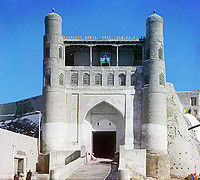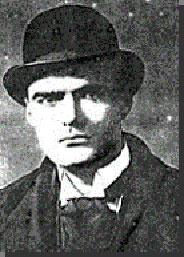Bokhara

At the end of 1913 Stephen Graham met Lord Northcliffe - owner of The Times and the Daily Mail - who asked him to write for his papers. A few weeks later Stephen began an epic journey through Russian central Asia, travelling via the town of Bokhara (left) on to the Altai mountains, where he stayed in a Cossack village. He was staying there when news came of the war in Europe.
When Stephen returned to Russia he filed numerous reports for The Times praising the Russian war effort, arguing that Russian troops were fired by a love of their country and the Orthodox Church, which he believed would be more than sufficient to counter Germany's superior military skill. Graham's reports increased his reputation as a Russian specialist and he was regularly consulted by the Minister for Munitions David Lloyd George. Stephen did not however forget his old interests and concerns. In 1915 he visited the Egyptian desert to see some of the earliest sites of Christianity. He discussed his experiences in one of his best books, The Way of Martha and the Way of Mary, which discussed the differences between eastern and western Christianity.
When Stephen returned to Russia he filed numerous reports for The Times praising the Russian war effort, arguing that Russian troops were fired by a love of their country and the Orthodox Church, which he believed would be more than sufficient to counter Germany's superior military skill. Graham's reports increased his reputation as a Russian specialist and he was regularly consulted by the Minister for Munitions David Lloyd George. Stephen did not however forget his old interests and concerns. In 1915 he visited the Egyptian desert to see some of the earliest sites of Christianity. He discussed his experiences in one of his best books, The Way of Martha and the Way of Mary, which discussed the differences between eastern and western Christianity.
Dmitrije Mitrinovic

Stephen spent a good deal of time back in Britain during the war. He lectured on the progress of the war and gave numerous sermons in London's churches on Russian spirituality. He also formed a friendship with the mysterious Serbian exile Dmitrije Mitrinovic (left), who with Graham and the Serbian priest Fr. Nikolai Velimirovic planned to launch a 'secret society' to re-spiritualise Britain. Graham hoped to revive 'Holy Britain' by fostering a great spiritual reawakening. In his 1917 novel The Priest of the Ideal he described such a campaign, carried out by one Richard Hampden, an alter ego for Graham himself. Stephen also wrote a rather curious semi-novel called The Quest of the Face which was inspired by the figure of Mitrinovic. Stephen's ideas were increasingly seen as eccentric by many leading writers and politicians, which perhaps explains why he was consulted less about Russian affairs, and was banned by the British government from returning to Russia after the Tsarist government was overthrown in February 1917. He had also alienated much liberal opinion by a series of pronouncements that were widely seen as anti-semitic. Graham's instinctive traditionalism meant that he always saw Russia's Jews as 'alien' figures, creatures of modernity, who could not understand the deep substance of the Russian soul.
Stephen was not in Russia when the Tsar was overthrown - he had returned back to Britain a few weeks earlier - and the death of 'Holy Russia' caused him enormous grief. He had believed that the Tsarist government for all its faults genuinely commanded the support of the Russian people.
Stephen was not in Russia when the Tsar was overthrown - he had returned back to Britain a few weeks earlier - and the death of 'Holy Russia' caused him enormous grief. He had believed that the Tsarist government for all its faults genuinely commanded the support of the Russian people.